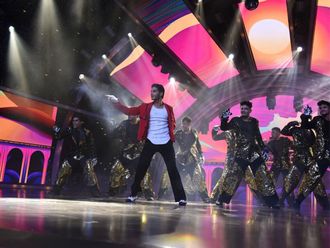
Busan, South Korea: One of Bollywood’s most successful producers believes the current generation of Indian filmmakers is set to conquer the world — by moving beyond the traditional song and dance format.
“India is still to find its Crouching Tiger, Hidden Dragon but it’s only a matter of time,” said Amar Butala, the producer behind the smash hit Bajrangi Bhaijaan, the second-highest grossing Bollywood film of all time.
The Chinese-language martial arts epic Crouching Tiger, Hidden Dragon, directed by Taiwan’s Ang Lee, was a hit when it was released in 2000, going on to win the Oscar for Best Foreign Language Film.
It collected an estimated $128 million (Dh470 million) from the international box office, still a record for a non-English language film and more than double the second-highest all-time earner, My Beautiful Life (1998) from Italy.
“As younger filmmakers in Bollywood change the way our films are made — whether it be the stories we tell or the use of song and dance — in the coming years we’ll see more and more Bollywood films reach out to the international audience,” said Butala.
He was speaking to AFP before the screening of Bajrangi Bhaijaan at the 20th Busan International Film Festival, the pre-eminent event of its kind in Asia.
The film has taken an estimated $91 million globally so far — placing it second only to the 2014-released comedy PK ($114 million) — and it follows the relationship that builds between an Indian man and a Pakistani girl trapped in India.
BIFF kicked off on Thursday with the world premiere of debut Indian director Mozez Singh’s Zubaan — a coming-of-age drama about a young Sikh who finds his way in life through music. It was the first time a Bollywood offering has opened BIFF.
“What I wanted to say with my film is that in order for you to reach your own dreams, you have to learn to be yourself,” said Singh.
Hosting duties for the opening ceremony were shared between South Korean actor Song Kang-Ho and Afghan actress Marina Gulbahari.
With the weather worsening, workers had toiled overnight to prepare both the Busan Cinema Centre and the city’s Haeundae beach, where many of the festival’s events are held.
These include “Open Talks” with the stars and, for the first time this year, a “Casting Board” event aimed at introducing up-and-coming Asian acting talent to international filmmakers.
Singh said he felt “extremely humbled” that his film was given the opportunity to open the festival on its 20th birthday.
“This is a super platform for any filmmaker and I wish all of us luck and the opening of many exciting new cinematic doors,” he said.
This year’s BIFF will screen 304 movies from 75 countries, including 94 world premieres, a number of them produced by the rising stars of Asian cinema.
Films already being heralded as Oscar contenders are also spread around the festival’s various programmes, including Hou Hsiao-Hsien’s sumptuous martial arts epic The Assassin.
Other Indian films on the programme here include two productions tapping into the industry’s traditions — and star-crossed lovers — in Masaan, an award winner at this year’s Cannes festival, and O Kadhal Kanmani.
The festival is also showcasing the rising stars from India’s film industry beyond Bollywood and Hindi-language movies.
Independent filmmaker’s Hari Viswanath’s debut Radio Set — about an old man alienated from his children — is in the running for Busan’s main New Currents award for first and second-time Asian filmmakers while the Assamese-language Kothanodi, which looks at the trial and tribulations of four mothers, also makes its world premiere.
Butala believes the success of his film — directed by Kabir Khan and starring current Indian box office king Salman Khan — has been down to its positive message, and that Indian filmmakers as a whole are now exploring a wider reach of topics, removed from the romances normally associated with Bollywood.
“Bajrangi Bhaijaan is an incredibly positive film,” said Butala. “It’s rare for a film to take such a balanced view of both India and Pakistan, without taking any sides. This touched an emotional chord.”
While there are more than 1,000 films produced across India every year, making it by far the world’s most active film-making nation, outside the country these films have only previously been watched by the Indian diaspora, according to Butala. But he believes times are rapidly changing.
“Filmmakers in India like everywhere in the world want their films to travel, to reach out to even larger audiences,” said Butala. “A mainstream Hindi language film is yet to successfully make that giant leap. But I think the opportunity to do this is ripe.”
There are 16 Indian films among the 304 productions screening at this year’s BIFF, which will run until October 10.












